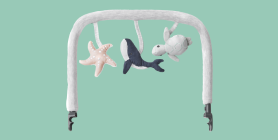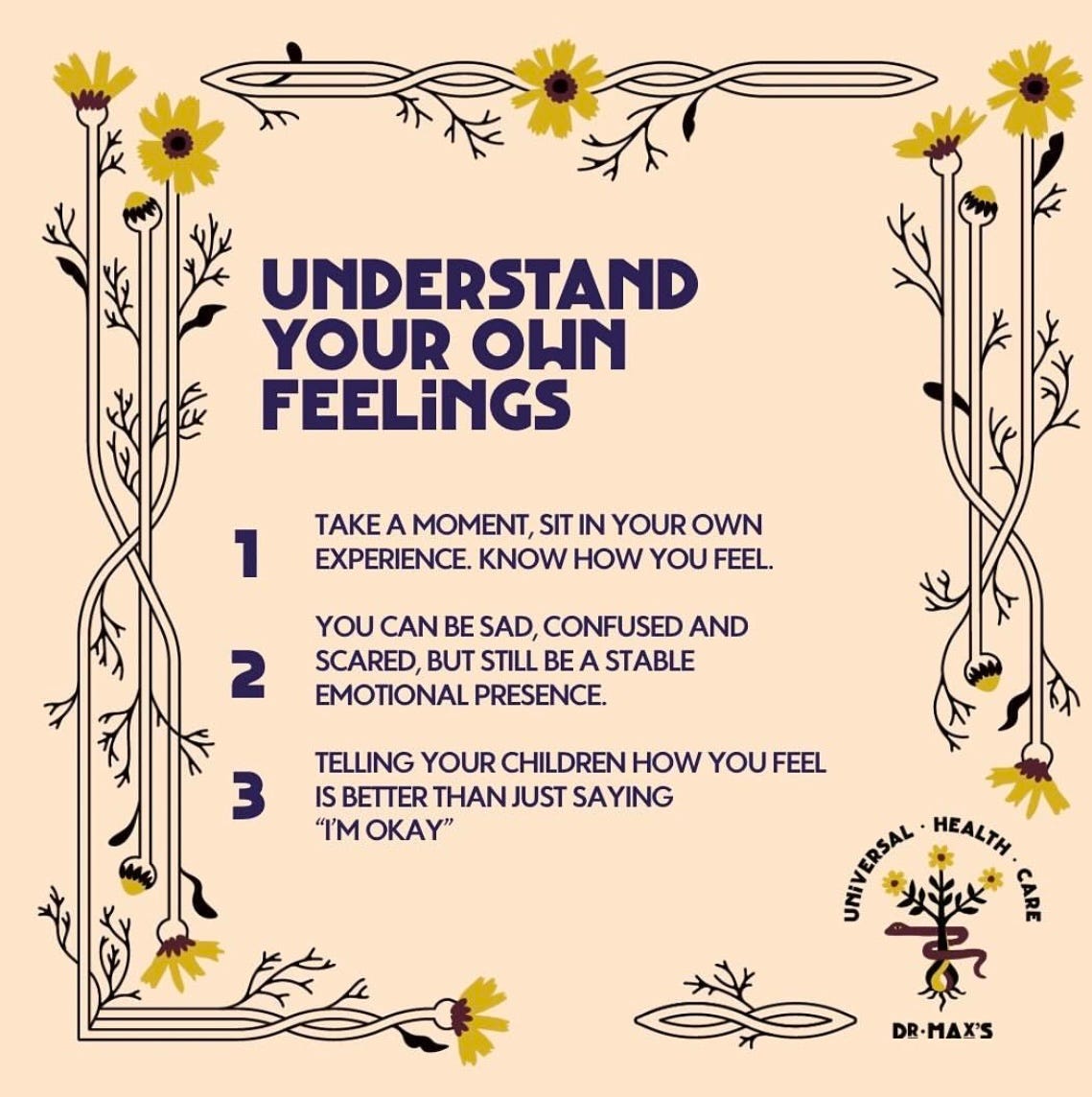Health & Wellness
Hi friend. I love you. I may not know you personally, but I’m taking time to write this because I see you, I’m with you, I love you, and I’m here to offer support that I hope will be of value.
There’s no easy way to experience or discuss such large and hard topics. Give yourself grace, space, and time. The emergency has already happened, and while your body is likely still in a state of emergency, you and your children have T-I-M-E to process. There’s no rush to address every thought, fear, or worry today, however here are some things to support you through this time:
You Don’t Have to Hide Your Sadness
You can be sad and stable. In a time of such instability, stability will be one of you and your children’s greatest needs. Finding stability means facing your sadness. Many of us were taught to hide our sadness, you don’t have to hide it; you have to manage it.
You can show your stability by saying things like, “Yes, I’m sad right now. This was a sad thing that happened. I’m going
What is an On-the-Move Sleep Bag?
As your toddler grows, so do their sleep needs. Traditional sleep solutions might no longer provide the same comfort and convenience they did during infancy. That’s where Ergobaby’s On-the-Move Sleep Bag comes in—a versatile solution that serves as both a sleeping sack and a romper for your active toddler. Designed for comfort, mobility, and convenience, this product makes it easy for toddlers to transition from sleep to play, offering the best of both worlds.What makes this toddler sleep sack unique?
- Dual Functionality: The On-the-Move Sleep Bag stands out because it’s more than just a sleep sack for toddlers. It’s a 2-in-1 product that works as a traditional sleep sack with legs for bedtime, but also converts into a romper, perfect for playtime. This unique design ensures your toddler stays comfortable while sleeping and active while playing, making it one of the best sleep sacks for toddlers who are constantly on the move.
- Convertible Design:
Understanding Postpartum Depression in Dads
Postpartum depression in dads, often referred to as paternal PPD, can occur due to hormonal changes, psychological stress, and lifestyle adjustments following the arrival of a new baby. Unlike mothers, whose PPD is often connected to hormonal shifts during and after pregnancy, fathers' depression is more likely linked to external stress factors such as changes in their relationship, financial pressures, and lack of sleep.
Why Dads’ Postpartum Depression Often Goes Unrecognized
Cultural stereotypes aboutThe arrival of a new baby is often portrayed as an unendingly joyous time, but the reality for many parents can be far more complex. Postpartum depression (PPD) is a condition that casts a shadow over this transformative life stage, affecting a significant number of new parents each year. Recognizing the postpartum depression signs, understanding its symptoms, seeking appropriate treatment, and knowing where to find help are critical steps in the journey towards recovery.
Postpartum Depression Definition
Postpartum depression is a severe, debilitating condition that can occur after the birth of a child. It's characterized by profound feelings of sadness, emptiness, or hopelessness that last for two weeks or more, significantly interfering with a parent's ability to function daily. Unlike the mild and short-lived "baby blues," PPD requires professional intervention and support.
Postpartum Depression Symptoms
The symptoms of postpartum depression can vary widely among individuals but
 Dr. Raquel Martin is an experienced licensed clinical psychologist, devoted professor, acclaimed researcher and scientist who believes deeply in the power of Black mental wealth – an affirming, lifelong journey that encourages Black people to center mental health practices as integral and intentionally linked to success and wellbeing.
Dr. Raquel Martin is an experienced licensed clinical psychologist, devoted professor, acclaimed researcher and scientist who believes deeply in the power of Black mental wealth – an affirming, lifelong journey that encourages Black people to center mental health practices as integral and intentionally linked to success and wellbeing.
Dr. Martin is on a mission to radically reimagine Black possibility by promoting Black mental health as key to legacy-building and longevity for generations to come.
As a mom, partner, mentor, and a Black woman navigating racism, gender bias and oppression, she embraces the importance of protecting mental health. Dr. Martin is publicly transparent with her own experiences and vulnerabilities because she knows that “healing in public helps those who need to heal in private.”
I got to chat with Dr. Raquel over zoom, and let me tell you, I could've talked with her for hours. As a mother of two young girls (7 and 4) who struggles with anxiety and depression, it'sIt’s not uncommon for expecting parents to consider (ruminate over, perseverate on, agitate in…?) how their identity will fare when “me” becomes “we.”
At LUMO we’ve had thousands of conversations with clients about this very topic. And, while we can’t promise we’ve heard it all, we’ve definitely been privy to quite a mélange. We’ve heard: “I’m going to stay exactly the same. People have been having babies for thousands of years. It’s fine.”
“I see my friends with kids and they’re so ensconced. They’re not even the same person. Will that happen to me?”
“I’m worried that parenting is going to be so demanding that I won’t have enough energy for work and I’ll lose my professional footing.”
In short, many new parents worry that their managers, family members, coworkers, friends with kids, friends without kids… basically everyone will see and treat them differently. That feels scary. Another concern that emerges for people in partnerships is that their dynamic with their partner will change
- Reduces the incidence of c-sections
- May shorten the length of labor
- Reduces epidural and analgesic requests
- Increases breastfeeding initiation and continuation
- Increases mother’s satisfaction of birth experience
- Can reduce the incidence of postpartum mood disorders
- Increases new parents’ confidence in the care of their newborn
This week we crank up the cardio using some tried and tested training protocols to raise the heart rate with low impact, high energy multi muscle movements. Watch your form, keep the movements smooth and controlled and focus on your posture and core activation throughout. You can adapt this workout to suit your fitness by using either just your body weight or adding in some small hand weights to turbo charge this session! You are aiming here for 10 back to back reps of each move...30 in total before resting for 1 minute and you are aiming to repeat the circuit 4 times.
- Side squat and bicep curl
- Alternating lunge and press
- Squat, curl and press
If you aren’t sure what stage of your recovery you are at, download our weekly workout guide here. For more parent and baby workouts and other family health and wellness, click here. _________________________
Please use caution when attempting any of the carries, exercise or activities highlighted on this blog, social media or any other
Just hearing the words “Mother’s Day” and I feel this knot in my stomach. It’s everywhere, from radio and tv commercials to displays at Target and coffee shops. The imagery of flowers and hearts, cards and candy. So much emphasis on this day as a happy one. I can’t be the only one that feels a mix of emotions, love for my own children, yes, but also an overwhelming sense of anxiety and sadness. Since I was a little girl I remember always wanting to be a Mom. I don’t have siblings, but I played house often and looking back it was always alone. I spent a lot of time alone. Not just because I was an only child, but because my Mom was emotionally unavailable. It wasn’t until I was an adult did I have a better understanding of the abuse I suffered, emotionally, verbally, the isolation and lack of support that led to my own challenges with self esteem and feeling worthy of relationships and receiving love. Becoming a mother, our ability to have healthy loving relationships, is directly tied



























